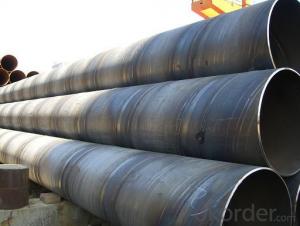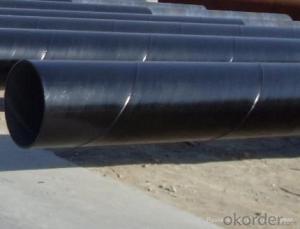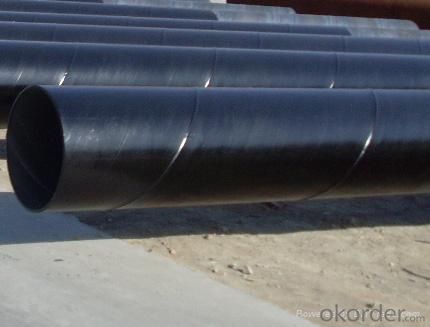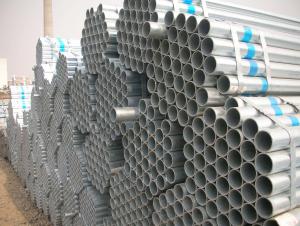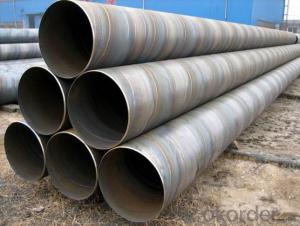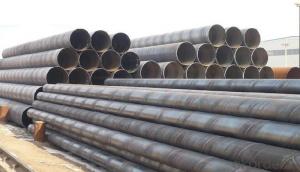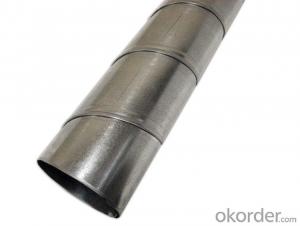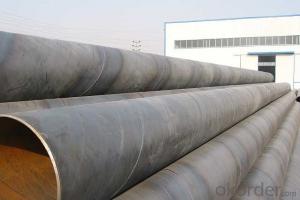SPIRAL STEEL PIPE48‘‘50’‘ LARGE DIAMETER PIPE
- Loading Port:
- Tianjin
- Payment Terms:
- TT OR LC
- Min Order Qty:
- 5 m.t.
- Supply Capability:
- 3000 m.t./month
OKorder Service Pledge
OKorder Financial Service
You Might Also Like
Packaging & Delivery
Packaging Detail: | standard export packing or as customer's requirement |
Delivery Detail: | within 10 - 30 days |
Specifications
Spiral Welded Steel Pipes and Tubes
1.Material:Q195-Q235
2.Length:1-12m
3.WT:1.0-14mm
4.O.D.:20-273mm
Spiral Welded Steel Pipes and Tubes
Product Description:
1.Material : Q235,Q345,L245,L290,L360,L415,L450,L485,GrB,X42,46,X52,X56,X60,X65,X70,X80,X100
2,Standard: SY/T5037-2000,GB/T9711-2011,API Spec 5L PSL1/PSL2,ASTM A252\A53,ISO3183,DIN17172,EN10217,JIS G3457,AWWA C200,ASTM A139,ASTM A671,ASTM A672
3.Wall thickness: 3.0mm-30mm
4.Outer diameter: φ168mm-3020mm
5,Length: 5m-12m or as your requirement
6,Corrosion protection standard: DIN30670,DIN30671, AWWAC210, AWWA C203, SY/T0413-2002,SY/T0414-2002
7,Application: Oil, gas, natural gas, water pipe, thermal electricity pipe, steel structure engineering, etc
Q195-q345 Material Steel Pipe's Materials
Elements | Chemical Compsition% | Mechanical Property | ||||||
C% | Mn% | S% | P% | Si% | Yield Point (Mpa) | Tensile Strength(Mpa) | Elongation | |
Q195 | 0.06-0.12 | 0.25-0.50 | <0.050< span=""> | <0.045< span=""> | <0.030< span=""> | >195 | 315-430 | 32-33 |
Q215 | 0.09-0.15 | 0.25-0.55 | <0.05< span=""> | <0.045< span=""> | <0.030< span=""> | >215 | 335-450 | 26-31 |
Q235 | 0.12-0.20 | 0.30-0.70 | <0.045< span=""> | <0.045< span=""> | <0.030< span=""> | >235 | 375-500 | 24-26 |
Q345 | <0.20< span=""> | 1.0-1.6 | <0.040< span=""> | <0.040< span=""> | <0.55< span=""> | >345 | 470-630 | 21-22 |
- Q: How do you prevent steel pipes from rusting?
- Various measures can be taken to prevent the rusting of steel pipes. One effective method is the application of a protective coating on the surface of the pipes. Different types of coatings, such as paint, epoxy, or zinc, can be used for this purpose. These coatings act as a barrier between the steel and the corrosive environment, thereby preventing direct contact between moisture, oxygen, and the metal, which can lead to rust formation. Another approach involves the use of corrosion inhibitors. These substances are added to the water or fluid flowing through the pipes, creating a protective film on the surface of the steel. This film acts as a shield, inhibiting the corrosion process and preventing the formation of rust. Regular maintenance plays a crucial role in preventing rust on steel pipes. It is essential to inspect the pipes regularly for any signs of damage or corrosion and promptly repair or replace any compromised areas. Additionally, keeping the pipes clean and dry by removing accumulated dirt or moisture helps prevent the formation of rust. In some cases, using stainless steel pipes instead of regular steel can be beneficial. Stainless steel contains chromium, which forms a passive oxide layer on the metal's surface. This layer acts as a natural barrier against corrosion, making stainless steel pipes highly resistant to rust. Finally, controlling the installation environment of the pipes can also help prevent rust. This can be achieved by maintaining proper ventilation, controlling humidity levels, and avoiding exposure to harsh chemicals or corrosive substances. By implementing these preventive measures, the lifespan and integrity of steel pipes can be significantly extended, while minimizing the risk of rust formation.
- Q: What is the difference between steel pipes and PVC pipes?
- Steel pipes are made from steel, which is a strong and durable material that can withstand high pressure and extreme temperatures. They are commonly used for transporting fluids and gases in industries such as oil and gas, construction, and plumbing. On the other hand, PVC pipes are made from polyvinyl chloride, a lightweight and corrosion-resistant plastic material. PVC pipes are more cost-effective, easier to install, and resistant to chemicals and corrosion. They are commonly used for drainage, irrigation, and plumbing in residential and commercial applications.
- Q: How are steel pipes used in the manufacturing of heat exchangers?
- Steel pipes are commonly used in the manufacturing of heat exchangers due to their high strength and durability. They serve as the primary components for carrying hot or cold fluids within the heat exchanger system. The steel pipes facilitate the efficient transfer of heat between the two fluids by offering excellent thermal conductivity. Additionally, the corrosion-resistant properties of steel ensure the longevity and reliability of the heat exchanger, making it suitable for various industrial applications.
- Q: How do you transport steel pipes safely?
- Transporting steel pipes safely requires proper planning, equipment, and adherence to safety measures. Here are some guidelines to ensure the safe transportation of steel pipes: 1. Choose appropriate transportation equipment: Use a flatbed trailer or a truck with a flatbed to transport steel pipes. Ensure that the trailer or truck has a strong and secure tie-down system to prevent the pipes from shifting during transit. 2. Secure the pipes: Use nylon or steel straps to secure the steel pipes to the trailer or truck bed. Make sure the straps are tightened properly, evenly distributing the weight of the pipes and preventing any movement or shifting. 3. Protect the pipes: Use pipe chocks or padding materials such as foam or rubber to prevent the pipes from rolling or rubbing against each other during transportation. This helps to minimize potential damage and maintain the integrity of the pipes. 4. Observe weight limits: Ensure that the weight of the steel pipes being transported does not exceed the load capacity of the transportation equipment. Overloading can lead to instability and compromise safety. 5. Follow road safety regulations: Adhere to all local traffic laws and regulations, including speed limits and securing all necessary permits or licenses for oversized loads if required. Additionally, use hazard warning signs or flags when transporting long or oversized steel pipes to alert other road users. 6. Conduct regular inspections: Before starting the journey, inspect the straps, tie-downs, and other securing mechanisms to ensure they are in good condition. Regularly check the load during transit to ensure it remains secure. 7. Plan the route: Choose a route that is suitable for the size and weight of the steel pipes being transported. Avoid roads with low bridges, narrow lanes, or weight restrictions that may pose a risk to the safe transportation of the pipes. 8. Consider weather conditions: Take into account weather conditions, such as strong winds or heavy rain, which can affect the stability of the load. Adjust the transport plan accordingly or delay the journey if necessary. 9. Train and educate drivers: Ensure that the drivers responsible for transporting steel pipes are well-trained and aware of the proper procedures for securing and transporting the load safely. Regularly update them on safety protocols and any changes in regulations. By following these guidelines, you can transport steel pipes safely, minimizing the risk of accidents, damage to the pipes, and ensuring the safety of everyone involved in the transportation process.
- Q: What are the different methods of pipe insulation for steel pipes?
- Various methods can be employed to insulate steel pipes, each offering distinct advantages and suitability for specific applications. Some commonly utilized techniques encompass: 1. Fiberglass insulation: Esteemed as a highly favored pipe insulation method, fiberglass insulation comprises fine glass fibers and is obtainable in diverse formats like rolls, sheets, or pre-formed sections. It boasts a lightweight nature, effortless installation, and exceptional thermal insulation attributes. 2. Foam insulation: Another efficacious means of insulating steel pipes is foam insulation, which can be procured in various forms including rigid foam boards or spray foam. It is renowned for its high insulating capacity and its ability to seal gaps and cracks, thereby enhancing energy efficiency. 3. Rubber insulation: Rubber insulation, also referred to as elastomeric insulation, is extensively employed in HVAC systems to insulate steel pipes. It possesses flexibility, durability, and resistance to moisture, making it suitable for both indoor and outdoor applications. Additionally, rubber insulation offers commendable thermal and acoustic insulation properties. 4. Polyethylene insulation: Polyethylene insulation presents a cost-effective alternative for insulating steel pipes. It can be found in diverse formats such as foam tubes or molded sections and is effortless to install. Polyethylene insulation provides commendable thermal insulation, safeguards against condensation, and exhibits resistance to water vapor diffusion. 5. Cellular glass insulation: Cellular glass insulation, a rigid insulation material produced from crushed glass and a foaming agent, is acknowledged for its exceptional thermal insulation attributes as well as its resistance to moisture, fire, and chemicals. It is commonly employed in cryogenic and high-temperature applications. When selecting the appropriate pipe insulation method for steel pipes, it is imperative to consider factors such as temperature, moisture conditions, and project-specific requirements. Seeking guidance from a professional or insulation expert can aid in determining the optimal insulation method based on the specific needs and conditions of the project.
- Q: Can steel pipes be used for conveying abrasive materials?
- Yes, steel pipes can be used for conveying abrasive materials. Steel pipes are known for their durability and strength, making them suitable for handling abrasive substances without significant wear or damage. Additionally, steel pipes can be coated or lined with materials such as rubber or ceramic to provide extra protection against abrasion and extend their lifespan.
- Q: What are the standard specifications for steel pipes?
- The standard specifications for steel pipes vary depending on the intended use and industry. However, some common standard specifications for steel pipes include dimensions (such as diameter, wall thickness, and length), material composition (such as chemical and mechanical properties), and specific requirements for different applications (such as pressure ratings or corrosion resistance). These specifications are established by industry organizations like ASTM International, American Society of Mechanical Engineers (ASME), and International Organization for Standardization (ISO) to ensure the quality, safety, and compatibility of steel pipes in various sectors such as construction, oil and gas, plumbing, and manufacturing.
- Q: Which is better, galvanized steel pipe or stainless steel?
- In rural and urban areas, it is often necessary to wash them in order to keep them in the open. In the heavily polluted industrial and coastal areas, the surface can be very dirty and even rust. But to obtain the aesthetic effect of outdoor environment, it is necessary to use nickel stainless steel. Therefore, 304 stainless steel is widely used in curtain walls, side walls, roofs and other building applications, but in corrosive industrial or marine atmospheres, it is better to use 316 stainless steel. There are several design criteria including 304 and 316 stainless steel.
- Q: What are the factors affecting the lifespan of steel pipes?
- There are several factors that can affect the lifespan of steel pipes. 1. Corrosion: Corrosion is one of the primary factors that can significantly reduce the lifespan of steel pipes. Exposure to moisture, chemicals, and other corrosive elements can lead to rusting and degradation of the pipe material over time. 2. Environmental conditions: The environment in which the steel pipes are installed plays a crucial role in their lifespan. Extreme temperatures, humidity, and exposure to various weather conditions can accelerate the corrosion process and weaken the pipe structure. 3. Water quality: The quality of the water flowing through the steel pipes can also impact their lifespan. Water with high acidity or alkalinity levels, excessive chlorine, or other contaminants can cause corrosion and deterioration of the pipe material. 4. Installation quality: The way steel pipes are installed can affect their lifespan. Poor installation practices, such as inadequate support or incorrect alignment, can lead to stress points and structural weaknesses, making the pipes more prone to failure. 5. Maintenance and repair: Regular maintenance and timely repairs are crucial in maximizing the lifespan of steel pipes. Proper cleaning, inspection, and corrosion protection measures can help identify and address potential issues before they progress and cause significant damage. 6. Design and material quality: The design and quality of steel used in pipe manufacturing are important factors in determining their lifespan. High-quality steel with appropriate alloy composition and thickness provides better resistance to corrosion and mechanical stress, ensuring a longer lifespan. 7. Load and pressure: The load and pressure that steel pipes are subjected to can impact their durability. Excessive pressure or frequent variations in pressure can put stress on the pipe walls, leading to fatigue or failure over time. By considering and addressing these factors, it is possible to extend the lifespan of steel pipes and ensure their reliable performance over an extended period.
- Q: How does the price of steel pipes fluctuate?
- The price of steel pipes fluctuates due to various factors, including changes in raw material costs, supply and demand dynamics, global economic conditions, and market competition. Fluctuations in the price of steel, which is a key component in pipe manufacturing, directly impact the cost of steel pipes. Additionally, shifts in demand for steel pipes in industries such as construction, oil and gas, and automotive can also influence their pricing. Market conditions, such as trade policies and geopolitical factors, can further contribute to price fluctuations. Therefore, the price of steel pipes is subject to constant change, driven by a combination of these factors.
Send your message to us
SPIRAL STEEL PIPE48‘‘50’‘ LARGE DIAMETER PIPE
- Loading Port:
- Tianjin
- Payment Terms:
- TT OR LC
- Min Order Qty:
- 5 m.t.
- Supply Capability:
- 3000 m.t./month
OKorder Service Pledge
OKorder Financial Service
Similar products
Hot products
Hot Searches
Related keywords
